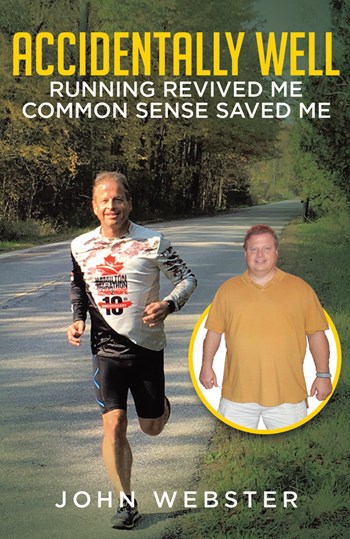The title of John Webster’s self-help-infused memoir, ACCIDENTALLY WELL: Running Revived Me, Common Sense Saved Me, is a bit of a misnomer in that the results he experienced from running were hardly an accident. In fact, Webster’s refreshingly candid recounting of his mid-life weight loss journey underscores an important point often missing from books and magazines touting a ‘quick & easy’ approach to losing pounds: sustainable weight loss requires a lifestyle change. Webster’s story is one that many adults will identify with: a random glance at the bathroom mirror followed by the sobering realization that he no longer recognized himself. Of course, Webster’s appearance was hardly a surprise—there were a myriad of veiled excuses and reasons for the weight, but they offered little in the way of solace. The scene could have easily turned into a momentary bout of self-pity, but instead, that otherwise random morning became a proverbial tipping point. From that day forward, Webster put one foot in front of the other (both literally and figuratively), and began what would become a transformative journey.
As Webster points out, he had little interest in a ‘quick fix.’ He didn’t want to just lose weight, he wanted to address the lifestyle behind his weight gain. Key to this transformation was movement, which came in the form of walking, and eventually, distance running. While those initial runs were painful and grueling, Webster was determined to stick with his routine. Eventually, the Ontario-based writer began routinely hitting the trails, logging more and more miles with each passing week. Additionally, he revamped his eating habits, and once again opted for a sustainable approach that revolved around small, but impactful changes like smaller portions and reducing his consumption of ‘junk’ food. Bit by bit, Webster began to feel a change, both physically and mentally. Before long, the author was running marathons, a miraculous feat given where he had started. Along the way, he also acquired a sense of balance in the other areas of his life, and learned the value of combining patience with persistence.
Despite the heavy focus on the many benefits of running, ACCIDENTALLY WELL is more a memoir than a self-help guide. Webster writes with a candid, conversational tone that makes for easy reading. As he points out in the book’s disclaimer, Webster isn’t looking to offer ‘advice,’ only his story. The statement is tantamount to standard boilerplate, but it also illuminates what ACCIDENTALLY WELL is, and what is not. Distance runners looking for the secret of a sub-three-hour marathon won’t find it here, nor will bio-lovers in search of a juicy tell-all. Readers will find no mention of crazy diets or unfeasible workout plans in ACCIDENTALLY WELL either. Instead, Webster consistently pushes the idea that if he can do it, so can you–there is no ‘one’ way to be healthy. Still, for those who may want to dig a little deeper, a series of appendices offer a variety of details regarding his running and overall life philosophy.
As with most self-help memoirs, ACCIDENTALLY WELL attempts to blend a personal journey with a smattering of practical ‘tips and tricks,’ and thanks to John Webster’s skill as a storyteller, in this case the book is an unqualified success.
~James Weiskittel for IndieReader

